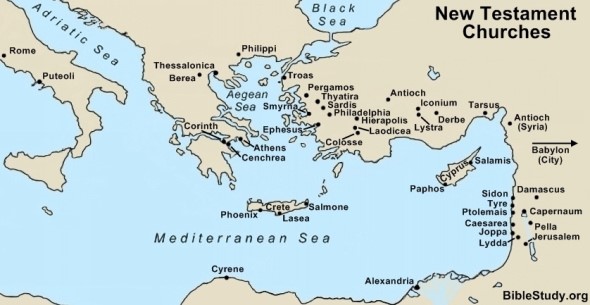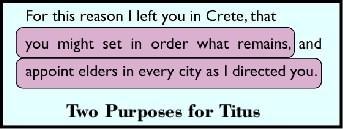Session 21 - Titus
Author
Paul. This is the third of his so-called pastoral epistles, the other two being 1 and 2 Timothy. Titus is mentioned 9 times in 2 Corinthians (2:13; 7:6, 13-14, 8:6, 16, 23; 12:18), where Paul refers to him as "my brother" (2:13), and "my partner and fellow worker" (8:23). One of only three Pauline epistles sent specifically to individuals.
Notice how Paul describes himself in 1:1:
- doulos = slave of God
- apostolos = apostle, messenger, one who is sent.
Date of Composition
Around 64 AD.
Purpose and Audience
Titus is not mentioned in Acts. He was a Greek convert (ie a Gentile) and a faithful fellow-worker with Paul in spreading the gospel and organizing the Church (see Gal 2:3; 2 Cor 8:16-23). The epistles that bears his name was written by Paul (1:1) and addressed "to Titus, my true son in the faith that we share" (1:4).
Evidence suggests that Paul and Titus had known one another for at least 15 years. That's quite an apprenticeship. They had been together in Galatia. He was involved in Paul's dealings with the Corinthian church. He travelled throughout Macedonia collecting funds for Christians in Jerusalem.

Some time after being released from his first Roman imprisonment, Paul visited the island of Crete with Titus.
Paul was unable to remain on the island, so he left Titus behind to set the Church in order (1:5). Paul's letter provides instructions about the duties of those who lead the Church. Specifically, it warns Titus to beware of false teachers and doctrines. He also speaks about the character and conduct befitting anyone who is called to leadership.
Like Timothy, Titus had a difficult assignment. When good leaders do not rise up, bad leaders will infiltrate and devastate the group. Paul was exercising his apostleship by delegating Titus to appoint elders in each town (this implies that the church/es there must have been disorganized and without proper leadership).

This letter, then, not only is a directive to Titus on how to set the church in order, but also a public endorsement of Titus' authority:
"You have the authority to correct them when necessary, so don't let anyone disregard what you say" (2:15)
and a statement on how the church should conduct itself.
The wording suggests that the churches on Crete were new, did not yet have recognized leaders (or those who were in place were fresh Christians) and were surrounded by unbelievers willing to take advantage to achieve their own doctrinal or social agendas (all too familiar!). Paul is writing to follow up verbal instruction that he had given Titus, to straighten out unfinished business and to appoint elders in each group of new Christians during the time left to him on Crete.
The main challenge that confronted Titus and the new leaders he would appoint lay in ensuring that the doctrine he preached and they accepted remained correct.
- However, the main qualifications for serving God were not knowledge and teaching skills, but personal qualities.
It appears that the church in Crete (like many others in the first century) was being influenced by false teachers and their doctrines (1:14; 3:9-11). They were unruly, emptyheaded and self-deceived (and deceiving others (1:10-16).
Some of them were "rebellious people who engage in useless talk and deceive others." (1:10). Paul encouraged Titus to be vigilant in sustaining right teaching and belief (1:13-16; 2:15), to appoint strong and appropriate leaders (1:1-9), and to teach the way to salvation to those who were not yet Christians (2:11-3:8).
Paul also warns Titus of the reputation of those living on Crete (Titus 1:12). This island, which was said to have been the ancient abode of "the father of gods and men," was the source of the saying, "to Crete a Cretan," meaning "to outwit a knave." Not a good character reference!
The untruthfulness of its people was proverbial, so that Paul even quoted one of their own prophets (no further details, but some historians believe him to be Epimenides, a 6th Century BC philosopher mentioned by Cicero and Aristotle) as saying: "The people of Crete are all liars, cruel animals, and lazy gluttons." (1:12). Very blunt language. This is the group of new believers Titus has been called to lead.
The Cretans of Paul's day have also been described as follows:
"The character of the people was unsteady, insincere, and quarrelsome; they were given to greediness, licentiousness, falsehood, and drunkenness, in no ordinary degree; and the Jews who had settled among them appear to have gone beyond the natives in immorality." (Anon.)
The Gospel is promising for the most unlikely people. But first you have to look deeper than first impressions.

Icon depicting Paul establishing Titus on Crete.
Structure
| Introduction, greetings | - | 1:1-4 |
| Setting up sound doctrine and leaders in the church | - | 1:5-9 |
| Exposing false teachers | - | 1:10-16 |
| Preaching sound doctrine | - | 2:1-15 |
| Using sound doctrine to provide correction | - | 3:1-11 |
| Conclusions | - | 3:12-15 |
Key Issues
Dealing with the Judaisers
Once again, Paul finds it necessary to instruct the leaders of the church to be on guard against the Judaizers, those who sought to add works to the gift of grace which produces salvation. These false teachers seem to be the main target of Paul's criticism (1:10). Paul warns against those who are "rebellious deceivers", especially those who continued to claim that circumcision and adherence to the rituals and ceremonies of the Mosaic Law were still necessary (Titus 1:10-11). This is a recurring theme throughout the epistles of Paul. The young elder Titus was already familiar with the practices of the Judaizers.
Paul's language is interesting:
"They must be silenced, because they are turning whole families away from the truth by their false teaching. And they do it only for money." (1:11)
Doing Good Works
Taken as a whole, Titus contains a good doctrinal summary, however it does not focus on explaining or defending points of doctrine.
God's truth shows how to live good lives (1:1). Titus contrasts what they were like before and after becoming Christians (3:3-8). Paul understood that when a body of believers embraces sound doctrine, the result is changed and purified lives that produce "good deeds". God's grace is the motivation for all good deeds. Six times (1:16; 2:7, 14; 3:1, 8, 14) the Christians in Crete are urged to do good works. We are not save by good works (see 3:5), but the way we live certainly shows whether or not we are saved (3:8).
There are fundamental differences between authentic Christians and non-Christians, as the following passage indicates:
"Everything is pure to those whose hearts are pure. But nothing is pure to those who are corrupt and unbelieving, because their minds and consciences are corrupted. Such people claim they know God, but they deny him by the way they live. They are detestable and disobedient, worthless for doing anything good." (1:15, 16).

The Incarnation
Three summaries of the incarnation appear in Titus, providing a framework within which we can view the work of God in the world and in our lives (Titus 1:1-4; 2:11-14; 3:4-7). All three involve the manifestation, or appearance, of God in Christ, in human flesh, rooting the Christian faith in the incarnation. Only when God the Son took on humanity in the person of Jesus was our faith in God made sure. In other words, since God poured out His grace, He cleanses His people from their sin and purifies believers for Himself. This grace of God instructs us to live upright and godly lives in this present age (2:11-3:8).
Letter to a Connect Group Leader
Like 1 & 2 Timothy, good leadership is a key theme, though the environment in which Titus is operating is different to that of Timothy. Paul directed Titus to establish a group of faithful elders to oversee the beliefs, governance and good conduct of the believers on Crete. He was to "speak the things which are fitting for sound doctrine" (Titus 2:1), a clear direction that this should be the young pastor's primary role.
Paul gave instructions to Titus about the roles of specific groups of people.
- Teach the older men to exercise self-control, to be worthy of respect, and to live wisely. They must have sound faith and be filled with love and patience.
- Teach the older women to live in a way that honors God. They must not slander others or be heavy drinkers. Instead, they should teach others what is good. These older women must train the younger women to love their husbands and their children, to live wisely and be pure, to work in their homes, to do good, and to be submissive to their husbands. Then they will not bring shame on the word of God.
- Younger women must be trained to love their husbands and children, to be self-controlled, pure, working at home, kind, and submissive to their husbands.
- Encourage young men to live wisely. Titus has to be a model of good works (2:8).
- Slaves must obey their masters and do their best to please them. They must not talk back or steal, but must show themselves to be entirely trustworthy and good. Then they will make the teaching about God our Savior attractive in every way.
as well as instructions to all believers about their conduct. Right living is essential because Christ "gave Himself for us to redeem us from every lawless deed," saving us "by the washing of regeneration and renewing by the Holy Spirit" (Titus 2:14; 3:5).

Christian communities haven't changed much
The believers are to obey government authorities (3:1). This was quite a step in a world where Christians were often subject to official suppression. Titus also has authority to deal with those who cause division (3:10).
Instructions for people inside the church (1:6-15):
- An elder (pastor/leader) must be above reproach, the husband of one wife, and his children must be believers and not open to the charge of debauchery or insubordination.
- An overseer must be above reproach as well, he must not be arrogant or quick-tempered or a drunkard or violent or greedy for gain, but hospitable, a lover of good, self-controlled, upright, holy, and disciplined. He must hold firm to the trustworthy word as taught, so that he may be able to give instruction in sound doctrine and to rebuke those who contradict it.
The Grace of God
God's grace is made available freely, for salvation and power to live the right way (no predestination here!) But a level of human involvement is essential. Paul emphasizes to Titus the need for teaching (1:11; 2:3,12), preaching (1:3), speaking (2:1,15), reminding (3:1), admonishing (2:4), exhorting (1:9;2:6,15) and rebuking (1:13;2:15) the believers where necessary, to ensure that they became "strong in the faith" (1:13). There is a tremendous call to action in the epistle to Titus. This is a book requiring people to "do."
Right teaching and the grace of God will produce right behaviour: knowing/doing right.
Second coming
"we look forward with hope to that wonderful day when the glory of our great God and Saviour, Jesus Christ, will be revealed." (2:13)
Jesus' immanent return is a strong motivation to sort out our lives and live for Him now.
For Reflection:
- We are called to live uprightly, awaiting the coming of Christ (2:11-15)
- People in authority are to be obeyed (3:1, 2)
- We are to avoid foolish divisions and focus on what teaches and builds up (3:9-11)
- "Our people must learn to do good by meeting the urgent needs of others; then they will not be unproductive". (3:14).






